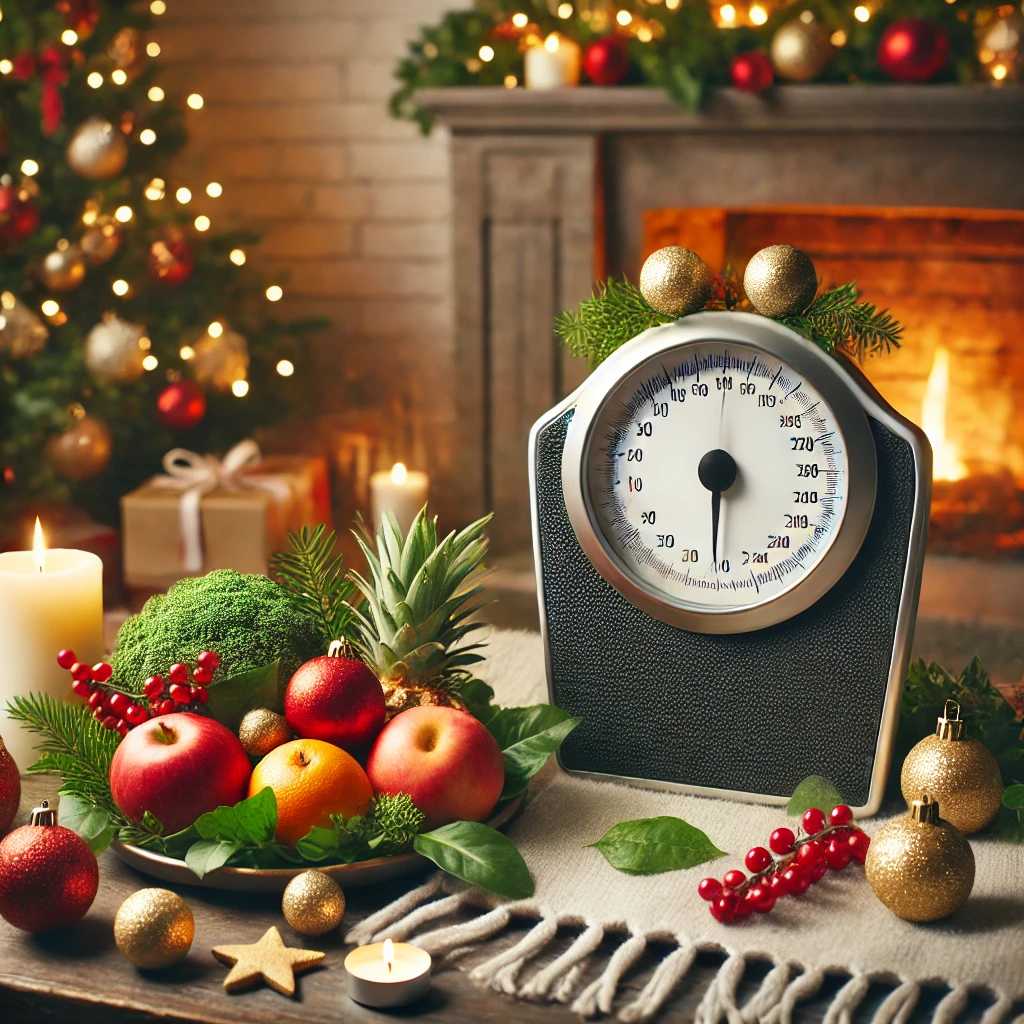
The holiday season can be joyful but also overwhelming. Between social events, shopping, and family commitments, stress can creep in—and when it does, it often impacts our eating habits and weight.
The Stress-Weight Connection
Stress triggers the release of cortisol, a hormone that can lead to cravings for sugary or high-fat foods, increased appetite, and abdominal weight gain. Stress can also disrupt sleep, which further impacts metabolism and hunger hormones.
Tips for Managing Holiday Stress
1. Set Boundaries
It’s okay to say no to extra commitments. Prioritize activities that bring you joy and let go of unnecessary obligations. Remember, saying no doesn’t mean you’re letting people down or being selfish. It means you’re taking care of yourself by avoiding the stress of overcommitting. When you prioritize your health and well-being, you’re better able to show up fully for the things and people that truly matter to you. By setting boundaries, you’re creating space for a healthier, more enjoyable holiday season.
Practical tips for setting boundaries
- Know Your Limits: Take a moment to reflect on how much you can realistically handle without feeling overwhelmed.
- Be Honest and Clear: Politely decline invitations or requests that don’t align with your priorities. For example, say, “I really appreciate the invitation, but I won’t be able to make it this time.”
- Start Small: If saying no feels difficult, begin by limiting your commitments to just one or two events per week.
- Prioritize What Matters: Focus on the activities and traditions that bring you the most joy, and let go of the rest.
2. Practice Mindfulness
Practicing mindfulness can help you stay calm and grounded. Mindfulness is about being fully present in the moment, and it’s an incredibly effective way to lower cortisol.
Getting started with mindfulness:
- Deep Breathing-Spending just 5 minutes on focused breathing can work wonders for your stress levels.
*How to do it
- Sit comfortably in a quiet space.
- Breathe in slowly through your nose for a count of 4, hold for 4, then exhale through your mouth for 6.
- Repeat this cycle for 5-10 minutes.
Why it works: Deep breathing activates your parasympathetic nervous system, signaling your body to relax.
- Mediation– Meditation is like a reset button for your mind. It helps you let go of racing thoughts and focus on the present.
*How to do it
- Sit or lie down in a comfortable position.
- Close your eyes and focus on your breath. If your mind wanders, gently bring your attention back to your breathing.
- Start with 5 minutes a day and gradually increase as you feel more comfortable.
- Tip: Apps like Headspace or Calm can guide you through simple meditations.

- Gentle Yoga– Yoga combines movement, breath, and mindfulness to reduce stress and tension in the body.
*How to do it
- Try poses like Child’s Pose, Cat-Cow Stretch, or a simple Forward Fold. These are beginner-friendly and can help release physical tension.
- Pair your movements with slow, intentional breathing for added relaxation.
- Bonus: Yoga also promotes better sleep, which is essential during busy holiday weeks
Why Mindfulness Matters:
By dedicating just 5-10 minutes a day to mindfulness, you can:
- Lower cortisol levels, reducing the physical effects of stress.
- Improve focus and clarity, making it easier to tackle holiday demands.
- Enhance emotional well-being, helping you stay calm and joyful throughout the season.
3. Keep Moving
When you exercise, your body releases endorphins, often called “feel-good” hormones, which act as natural stress relievers. Physical activity also reduces cortisol levels (the stress hormone) and improves blood flow, helping you think more clearly and feel more energized.
Here are a few ways to incorporate movement into your day, no matter how hectic things get:
- Take a brisk walk.
Tip:
Use walking as a way to multitask—walk while catching up with a friend, listening to a podcast, or doing a quick errand.
- Dance it out.
Why it works- Dancing is not only fun but also a great way to get your heart rate up. It’s a stress-busting workout you can do in your living room!
Create a playlist of your favorite upbeat songs and dance for 10-15 minutes. It’s a quick mood booster.
- Try strength training or bodyweight exercises.
Why it works- Building strength through resistance training improves both physical and mental resilience.
Short, home-based workouts like squats, lunges, push-ups, or resistance band exercises can fit into even the busiest schedule.
Consistency is key. You don’t have to do long, intense workouts—just aim to move your body daily. A little goes a long way in keeping stress at bay and ensuring you feel your best this holiday season. 💪🎄

4. Focus on Balanced Nutrition
While it’s normal to enjoy festive foods, maintaining a balanced diet can play a key role in reducing stress and keeping your body energized and resilient during this time.
When you consume whole, nutrient-dense foods, your body can better regulate cortisol and manage cravings and energy levels.
One of the simplest strategies to keep your nutrition on track while still enjoying the season is the balanced plate method:
- Fill Half Your Plate with Non-Starchy Veggies: Look for salads, roasted vegetables, or steamed greens. Vegetables are rich in vitamins, minerals, and antioxidants that support overall health and combat inflammation triggered by stress.
- Reserve a Quarter for Lean Protein: Think turkey, chicken, fish, or plant-based options like beans or tofu. Protein keeps you satisfied longer and helps stabilize blood sugar reducing energy crashes and mood swings that contribute to stress.
- Use the Remaining Quarter for Whole Grains or Starches: Choose dishes like quinoa, sweet potatoes, or whole-grain bread. These provide slow-digesting carbs that fuel your brain and help you stay calm and focused. If traditional holiday sides like mashed potatoes or stuffing are calling your name, take a portion and savor it.
- Don’t Skip Healthy Fats: Avocados, extra virgin olive oil, and fatty fish like salmon support brain health and regulate mood.
5. Stay Hydrated
It’s easy to overlook hydration during the busy holiday season, but staying well-hydrated is one of the simplest and most effective ways to maintain your health and energy. Dehydration doesn’t just make you thirsty—it can also mimic hunger, affect your mood, and increase stress levels.
How Dehydration Impacts Your Body:
- Hunger vs. Thirst Confusion
Dehydration can send signals to your brain that feel similar to hunger, leading to unnecessary snacking or overeating. Before reaching for a holiday cookie, try drinking a glass of water first to see if that satisfies your body’s needs. - Increased Stress Levels
Even mild dehydration can elevate cortisol levels, your body’s primary stress hormone. This can leave you feeling more anxious or overwhelmed during an already busy time of year. - Low Energy and Fatigue
Water is essential for maintaining energy. Dehydration can leave you feeling sluggish, making it harder to enjoy holiday activities or stick to your healthy habits.
Tips to stay hydrated throughout the holiday season:
- Keep a water bottle handy. Invest in a reusable water bottle and carry it with you everywhere—shopping trips, family gatherings, or even while wrapping presents.
- Start your day with water. Begin your morning with a glass of water to rehydrate after a night of sleep. It’s a simple habit that sets a healthy tone for the rest of the day.
- Follow the drink before you eat guideline. Before each meal or snack, drink a glass of water. This not only helps with hydration but can also prevent confusing hunger with thirst.
- Set hydration goals. Aim for 1/2 your body weight in ounces of water or at least 8 cups (64 ounces) of water a day, though your needs may vary based on your activity level, diet, and climate. Using an app or tracker can help you stay accountable.
- Hydrate during festivities. Alcohol and caffeine can be dehydrating, so balance them with water. For every alcoholic drink, have a glass of water to stay hydrated and reduce hangover risk.
Remember, the holiday season is meant to be a time of joy, connection, and celebration—not stress and overwhelm. By taking small, mindful steps to prioritize your well-being, you can navigate this busy time with balance and confidence. Embrace the moments that matter, nourish your body and mind, and give yourself grace along the way. Your health is the greatest gift you can give yourself this season, and navigating the holidays with mindfulness and intentionality sets the foundation for a brighter, healthier new year.
